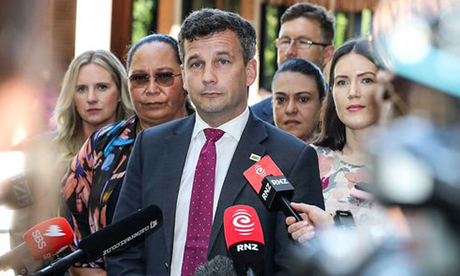Christian leaders want MPs to vote down the Treaty Principles Bill at its first reading.
The 440 senior leaders from Catholic, Anglican, Salvation Army, Baptist and Methodist denominations, under the “Common Grace” umbrella, expressed their views in an open letter.
On Monday, September 9, the Cabinet saw a draft version of David Seymour’s controversial bill for the first time.
The ACT leader’s bill will have its first reading in November and, if supported, will be sent to a select committee for discussion.
As part of their coalition agreement with ACT, National and NZ First said they would not support the bill beyond the first reading.
However, as a matter of process, the Church leaders who signed the letter want National or NZ First to break their coalition agreement and vote down the bill at the first reading.
Failing to garner support at the first reading would prevent the bill’s progress and potentially destabilise the Government.
Allowing the bill to progress to the Select Committee stage opens the process to what Richard Harman in Politico labels as a “procession of extremists from either side of the Treaty debate”.
The religious leaders say they have fears for the country if it progresses beyond its first reading.
One of the Christian leaders, the Very Reverend Jay Ruka, Dean of Taranaki Cathedral, labels the bill “dangerous”.
“He is tricking New Zealanders into thinking that to honour our founding contract is to demerit democratic representation. This is a lie. As a Christian leader, I steadfastly oppose this falsity. The Treaty Principles Bill is holding our nation in contempt,” says Ruka.
Catholic signatories
A range of Catholic individuals featured in the letter’s 400-plus list of signatories.
Bishops Michael Dooley, Steve Lowe, and Archbishop Paul Martin from the New Zealand Catholic Bishops Conference signed the letter.
While other Catholic leaders including sisters, priests and emeritus bishops supported the initiative, CathNews learned from some signatories that they had neither seen a draft of the Treaty Principles Bill nor were conversant with the content of the open letter.
A covenant
In the Open Letter, the Christian leaders express their commitment to Te Tiriti – the Treaty of Waitangi.
“As Christian leaders from across Aotearoa New Zealand, we express our commitment to Te Tiriti o Waitangi.”
“Te Tiriti o Waitangi provides a basis for finding common ground, recognising and reconciling past wrongs, and acts as a moral and equitable compass for our democracy” write the leaders.
The signatories say the Treaty is a covenant between people.
“We believe God takes covenants seriously and that we are likewise called to honour our promises.
“As Christian leaders from across Aotearoa New Zealand, we express our commitment to Te Tiriti o Waitangi.
“As inheritors of the legacy of the missionaries involved in the drafting, promoting and signing of Te Tiriti o Waitangi, we acknowledge a duty of care for upholding the mana of Te Tiriti o Waitangi.”
The leaders say they commit their churches to deepening Treaty education and pursuing reconciliation.
“We will work to ensure the flourishing of life in Aotearoa New Zealand for all peoples living here, both Tangata Tiriti and Tangata Whenua, as Te Tiriti of Waitangi enables.”
Seymour unhappy
David Seymour is not pleased with church involvement in his political plans, saying the churches do not own New Zealanders’ moral compass.
In a post on social media Seymour said the “core Christian principle of imago dei” automatically meant everyone has equal dignity, and the belief was at odds with the recent interpretation of the Treaty of Waitangi.
“It would be unusual, to say the least, for two thousand years of Christian faith to be overturned by a one page Treaty signed by a few hundred people in one country” he said.
“If you wonder why church attendance and reported Christianity is in decline in New Zealand, today’s display of church leaders abandoning a core, if not the core, Christian belief to play politics might be a clue.”
He told the Herald that the churches’ “pushback” was undemocratic.
He said it wasn’t the first time churches had tried to interfere in democracy, citing the End of Life Choice Act as an example.
His coalition partners, National and NZ First, say they won’t support the bill past a first reading.
They reiterated their stance last month at the late Kīngi Tūheitia’s 18th coronation celebrations at Tūrangawaewae.
Prime Minister Christopher Luxon stressed this remained the case when the Common Grace letter was published yesterday.
Source
Additional readingNews category: Great reads, New Zealand.




